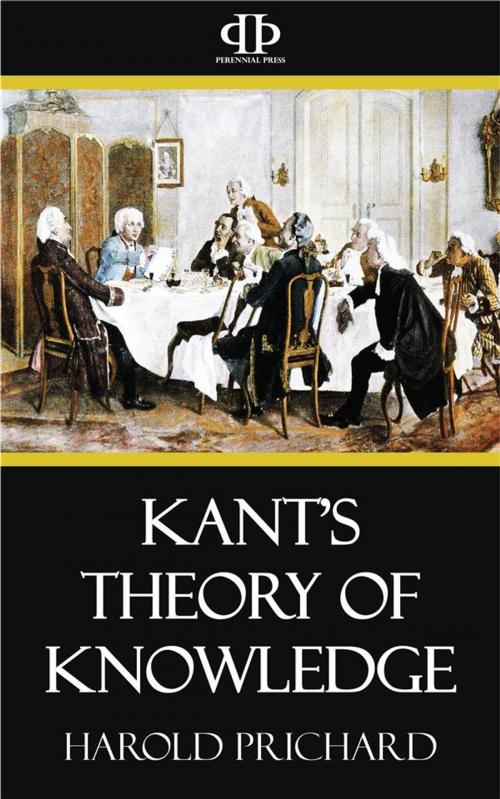Kant's Theory of Knowledge
Nonfiction, Religion & Spirituality, Philosophy, Epistemology, Metaphysics| Author: | Harold Prichard | ISBN: | 9781518327292 |
| Publisher: | Perennial Press | Publication: | December 4, 2015 |
| Imprint: | Language: | English |
| Author: | Harold Prichard |
| ISBN: | 9781518327292 |
| Publisher: | Perennial Press |
| Publication: | December 4, 2015 |
| Imprint: | |
| Language: | English |
The problem of the Critique may be stated in outline and approximately in Kant's own words as follows. Human reason is called upon to consider certain questions, which it cannot decline, as they are presented by its own nature, but which it cannot answer. These questions relate to God, freedom of the will, and immortality. And the name for the subject which has to deal with these questions is metaphysics. At one time metaphysics was regarded as the queen of all the sciences, and the importance of its aim justified the title. At first the subject, propounding as it did a dogmatic system, exercised a despotic sway. But its subsequent failure brought it into disrepute. It has constantly been compelled to retrace its steps; there has been fundamental disagreement among philosophers, and no philosopher has successfully refuted his critics. Consequently the current attitude to the subject is one of weariness and indifference. Yet humanity cannot really be indifferent to such problems; even those who profess indifference inevitably make metaphysical assertions; and the current attitude is a sign not of levity but of a refusal to put up with the illusory knowledge offered by contemporary philosophy. Now the objects of metaphysics, God, freedom, and immortality, are not objects of experience in the sense in which a tree or a stone is an object of experience. Hence our views about them cannot be due to experience; they must somehow be apprehended by pure reason, i. e. by thinking and without appeal to experience. Moreover, it is in fact by thinking that men have always tried to solve the problems concerning God, freedom, and immortality. What, then, is the cause of the unsatisfactory treatment of these problems and men's consequent indifference? It must, in some way, lie in a failure to attain the sure scientific method, and really consists in the neglect of an inquiry which should be a preliminary to all others in metaphysics. Men ought to have begun with a critical investigation of pure reason itself. Reason should have examined its own nature, to ascertain in general the extent to which it is capable of attaining knowledge without the aid of experience. This examination will decide whether reason is able to deal with the problems of God, freedom, and immortality at all; and without it no discussion of these problems will have a solid foundation. It is this preliminary investigation which the Critique of Pure Reason proposes to undertake. Its aim is to answer the question, 'How far can reason go, without the material presented and the aid furnished by experience?' and the result furnishes the solution, or at least the key to the solution, of all metaphysical problems...
The problem of the Critique may be stated in outline and approximately in Kant's own words as follows. Human reason is called upon to consider certain questions, which it cannot decline, as they are presented by its own nature, but which it cannot answer. These questions relate to God, freedom of the will, and immortality. And the name for the subject which has to deal with these questions is metaphysics. At one time metaphysics was regarded as the queen of all the sciences, and the importance of its aim justified the title. At first the subject, propounding as it did a dogmatic system, exercised a despotic sway. But its subsequent failure brought it into disrepute. It has constantly been compelled to retrace its steps; there has been fundamental disagreement among philosophers, and no philosopher has successfully refuted his critics. Consequently the current attitude to the subject is one of weariness and indifference. Yet humanity cannot really be indifferent to such problems; even those who profess indifference inevitably make metaphysical assertions; and the current attitude is a sign not of levity but of a refusal to put up with the illusory knowledge offered by contemporary philosophy. Now the objects of metaphysics, God, freedom, and immortality, are not objects of experience in the sense in which a tree or a stone is an object of experience. Hence our views about them cannot be due to experience; they must somehow be apprehended by pure reason, i. e. by thinking and without appeal to experience. Moreover, it is in fact by thinking that men have always tried to solve the problems concerning God, freedom, and immortality. What, then, is the cause of the unsatisfactory treatment of these problems and men's consequent indifference? It must, in some way, lie in a failure to attain the sure scientific method, and really consists in the neglect of an inquiry which should be a preliminary to all others in metaphysics. Men ought to have begun with a critical investigation of pure reason itself. Reason should have examined its own nature, to ascertain in general the extent to which it is capable of attaining knowledge without the aid of experience. This examination will decide whether reason is able to deal with the problems of God, freedom, and immortality at all; and without it no discussion of these problems will have a solid foundation. It is this preliminary investigation which the Critique of Pure Reason proposes to undertake. Its aim is to answer the question, 'How far can reason go, without the material presented and the aid furnished by experience?' and the result furnishes the solution, or at least the key to the solution, of all metaphysical problems...















